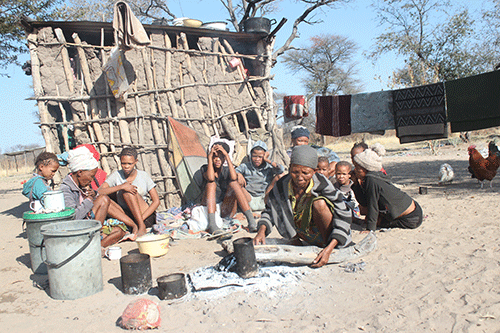In an attempt to unchain the most destitute from the yoke of poverty, the government is set to spend over N$100 million to feed around 29 000 marginalised communities’ households in the current financial year.
The detail is contained in deputy gender and social welfare minister Bernadette Jagger’s budget motivation statement, delivered in Parliament for
debate this week.
Namibia’s social safety nets, albeit being criticised by certain quarters who argue that the funds be channelled to money-generating or employment-creating initiatives, are among the best in Africa.
At present, there are 199 649 (98% coverage) pensioners receiving the old-age grant of N$1 400. The ministry has also transformed the food bank programme (FBP) into a conditional basic income grant (CBIG) during the current 2022/23 financial year.
A total of 8 047 households (37 053 individuals) received the CBIG across all fourteen regions as part of the first phase of the implementation of the basic income grant to serve the urban and peri-urban poor.
The social grants were provided to 357 036 orphans and vulnerable children, who are currently in the grant system.
“A total number of 29 004 households of marginalised communities are currently benefiting from the special feeding programme, where food items are provided. A total amount of N$101 million has been allocated to this main division for the 2023/2024 financial year for the implementation of programmes for the marginalised communities, inclusive of personnel expenditure,” the former Kunene education director said.
She added: “In order to implement programmes and projects for marginalised communities, an amount of
N$83 million has been allocated for the 2023/2024 financial year to cover
expenditures in respect of education support to marginalised students, livelihood support, funeral services and the San feeding programme”.
During the 2022/2023 financial year, 2 893 learners from marginalised
communities were enrolled at different primary and secondary schools across the country.
They were assisted with transportation as part of the education support programme.
“This number has increased to 2 973 learners in the current financial year. Additionally, 240 students, registered at various institutions of higher learning, are being assisted with the full payments of tuition and accommodation fees as well as monthly living allowances,” she added.
On top of this, N$ 33.7 million is earmarked to provide financial support to students with disabilities at tertiary institutions, provision of basic commodities to persons with severe disabilities, personnel expenditure and subsidy to the National Disability Council of Namibia.
In addition, the ministry has supported 708 persons with severe disabilities, mostly children with cerebral palsy, by providing them with basic supplies, such as nappies, formula milk, prep, bibs, sanitary pads and portable showers and toilets over the last financial year.
Continuing in this regard, N$972 million is budgeted to cover the expenditure of
social grants for persons with disabilities (adults and children).
“The grant for children with disabilities under the age of 16 was increased from N$250 to N$ 1300 [a month],” she added.
More so, 148 students with disabilities were provided with financial support through the student grant programme during 2022/23. Fifteen of those students are due to graduate this year, while about 120 are expected to benefit from this programme during the current financial year.
“The support includes tuition fees, accommodation, transport allowance, Sign language interpreters and assistive devices. A number of 50 291 persons with disabilities were provided with disability grants.
The ministry has further compiled and submitted a list of the graduates to the Employment Equity Commission for further transmission to the Ministry of Labour, Industrial Relations and Employment Creation,” she added.
“The old-age grant was increased from N$1 300 to N$1 400 per beneficiary, while the orphan and vulnerable children grant was increased from N$250 to N$350 during the financial year 2023/2024,” she
reiterated.
All in all, a total amount of N$3.7 billion is reserved for government’s social grants, including grants to pensioners, CIBG, funeral cover for pensioners and personnel expenditure.
The ministry was allocated N$6.5 billion for the current financial year.
– emumbuu@nepc.com.na


